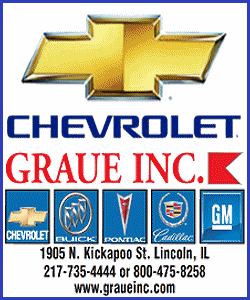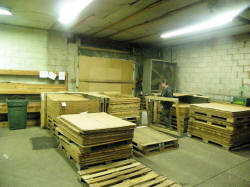|
 Jack Barrick sits behind a desk, looking at a file of pictures
and papers. He hands a picture across his desk to show what the
business looked like a decade ago, and more pictures going even
further back. Jack Barrick sits behind a desk, looking at a file of pictures
and papers. He hands a picture across his desk to show what the
business looked like a decade ago, and more pictures going even
further back.
These loose pictures weren't necessary to tell the business
story, because in the office with a few desks, a few file cabinets
and not much else, the walls are crowded with pictures in cases or
frames. The photos, dating back to Feb. 15, 1935, tell a rich,
ever-changing history of the business.
Working the three-generation family-owned business are Jack and
his son John Barrick. The milestone for the business and why it has
been successful is obvious on observing and talking to both men.
Founder Lewis Barrick was a hard worker, and both son and
grandson have followed suit at their company by doing whatever is
needed to make sure another day's essential obligations are
fulfilled.
While Jack has been sidelined fighting a foot injury for the past
few months, he sits at a desk, and son John, the third-generation
operator of the company, runs in and out. John looks at scheduling,
weather reports, confirms loads and then goes back into the
warehouse to assist wherever needed.

The business of 20-plus employees is very busy even in these
challenging economic times. On the shipment board inside the office
are listed the loads planned for the next week. The schedule
includes weekends.
On this day, an employee has called in sick and John has taken
over the duties of helping recycle and clean pallets, a business he
developed that is just one segment of the company's current business
plan.
The business of trucking is all about being reliable. Companies
requiring shipments in or shipments out need transport, not excuses
why shipments aren't coming or going on time. The transfer business
is demanding. It takes ownership and employees who understand this
sense of obligation. Without that understanding, a trucking business
doesn't last long. With that kind of dedication, a company can make
it to their 75th anniversary.
The number 75 crops up more in the Barrick story. In 1935, Lewis
A. Barrick took $75 of his savings and borrowed $75 more from his
father-in-law, August John Feldman. With the money he bought a used
1931 Ford Model AA truck and began Barrick Transfer and Beverage Co.
Lewis began hauling meat and freight from the Gulf, Mobile and
Ohio Railroad and the Illinois Central Railroad. They picked up the
wares from the nearby terminal, supplying the end transport to
stores and businesses, many of which were located along Route 66.
Lewis was, by his son Jack's own admission, a tough man to work
for, but there is no question the man himself was a tough,
hard-nosed worker. Jack recalled that his dad would do whatever he
had to in order to make the business successful. He never asked of
anyone more than he would and did do himself at work.

Jack remembers how his father picked up soda in Chicago and
hauled it to area stores and taverns. Lewis and Route 66 were
frequent companions in those early days and Jack remembers taking the
trip with him as a young boy.
In the '30s, soda still came in glass bottles lined up in wooden
crates. That meant in winter months, when the soda could freeze,
Lewis would have to unload the truck at night, cart all the soda
into the basement of the family home and then reload his truck the
next morning to make the local deliveries.
Lewis Barrick was always looking for more work, and in 1938 he
added beer distribution to his soda and freight operations. Over the
next half-century, the Barricks would handle Stag, Budweiser,
Hamm's, Old Style and Stroh's products.
During World War II, Lewis purchased a 1935 Dodge tractor and
grain trailer from a seed dealer and turned the grain trailer into a
standard trailer. This gave him an opportunity to haul larger loads.
Although a war was going on, Barrick and his now half-dozen
employees were excused from the military draft. The company also had
no problem getting gas and tires, which were being rationed at the
time. This was because the company was contributing to the war
effort. Barrick transported chickens and eggs from the Lincoln
Armour hatchery to the Air Force base at Rantoul.
Jack says his mother, Mildred, also helped haul the chickens and
eggs up Route 66 to Chicago as well as Rantoul. The novelty of a
female driver at least meant Mildred didn't have to load and unload,
while Lewis had to do those tasks himself.
Always the entrepreneur, Lewis Barrick also became an authorized
North American Van Lines agent during the war years. He would haul a
load of furniture up Route 66 to Chicago and then come back with a
truck full of soda for local distribution. This meant there was no
wasted motion, no empty loads as Lewis continued to seek more jobs
and more efficient ways to continue the company's expansion.
[to top of second column] |

Lewis Barrick was undaunted by any hauling task. He moved heavy
equipment and machines into the factories springing up in the
Lincoln area. Once when the Lehn & Fink plant, which made products
such as Bayer aspirin and Lysol products, needed two 80,000-pound
tanks hauled from the rail cars to the plant, Barrick devised a way
to handle the challenge. Driving to St. Louis he purchased a 50-ton
hydraulic jack. He then made a ramp out of railroad ties to unload
the huge tanks from the railroad cars.
Barrick also handled delivering the printing presses and the huge
800-pound rolls of paper for the Lincoln paper back in those days.
Lewis Barrick was ahead of his time in understanding that Lincoln
was the hub of the great Route 66 and other highways throughout the
Midwest. He started working as a freight distributor with other
companies from St. Louis to Chicago. The company would operate a
terminal in Lincoln as well as St. Louis and Chicago as the business
expanded to deliver goods throughout central Illinois.
In 1976, son Jack purchased the business from his father and
changed the name to Barrick Distributing.
As the years went by, requirements for beer distributorships
became increasingly difficult for a smaller distributor, and Jack
sold off that business in 1994.
Jack says the adjustment of not hauling local beverage to all the
area and stores was a difficult transition for his dad. Lewis loved
people and although supposedly "retired" he still made many of the
local deliveries. Lewis never did really retire and worked every
day, including many weekends, right up to his death in 1996.
Jack recalls one day when he was bringing in a pair of 1995
Freightliners with sticker prices on them of $150,000 each. Both Jack and
son John recalled Lewis was amazed at how costs of buying a truck
had escalated since the early days and that first $150 truck. John
and Jack both said with smiles that although the patriarch of the
business wasn't thrilled with the price of the rigs, he hung around
the office that night until they came in so he could inspect what
cost so much.
John took over the business in 2004, and like his father and
grandfather before him, he is a hands-on owner.

John mentioned during a tour of the plant that when he started
working at the company as a youngster, an employee asked why he was
driving an older rig rather than one of the newer ones. John said the employee tractors were assigned by seniority, and he
didn't have the seniority yet to drive one of the newer rigs.
While walking the facility, John also made a telling statement
that shows the lessons learned from grandfather and father about being a
people-oriented owner. "We have really great employees," he said. "A
company like ours wouldn't last 75 days in this business, let alone
75 years, without the people we have who work here."
Now in its 75th year, Barrick Enterprises has once again
redefined its job. They now are haulers for Saint Gobain Containers
in Lincoln, Diageo Distributing in Plainfield, Nabisco Foods in
Chicago and Michigan City, Ind., Pepsi Cola Bottling in Munster,
Ind., and PacMoore Products in Hammond, Ind.
The hauling for the Saint Gobain plant has become a huge
undertaking. Barrick has load after load of Smirnoff Ice bottles
being picked up for delivery to a center in Peoria. The number of
bottles is staggering. With 20 pallets of bottles per truck, the
company hauls millions of bottles out of the factory every month.
Still that wasn't enough work for young John, and he saw the
opportunity to start a pallet cleaning and recycling business to
meet the demands for hauling glass bottles and other products that
carry stringent health codes.
Now an old section of the warehouse is busy with men cleaning
pallets, sorting the cardboard sleeves that got between layers of
bottles and getting another load of pallets prepared to be used
again.

Besides the pallet recycling business, John has also added a
fleet of dump trucks and a pavement seal coating business to make
sure every day at Barrick Enterprises is a busy one.
Jack said he is certain grandfather Lewis would be very proud of
how his grandson is managing the business and keeping it going in
these uncertain times.
Congratulations to Barrick Enterprises on 75 years in business.
[By
MIKE FAK]
 |